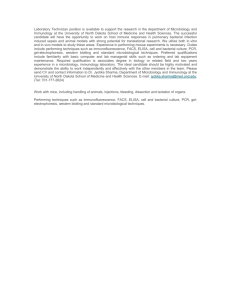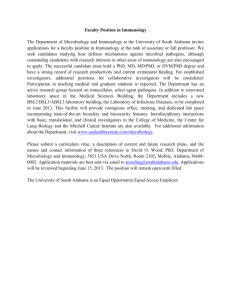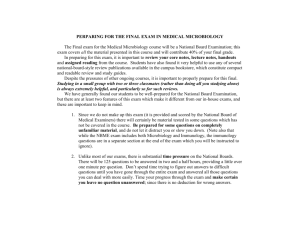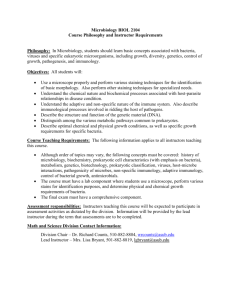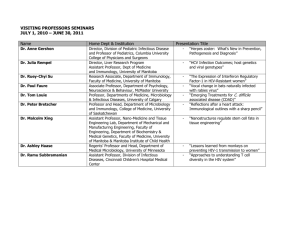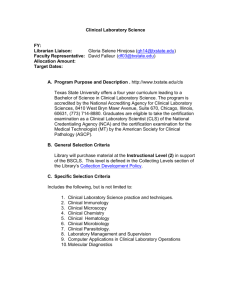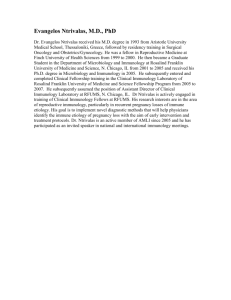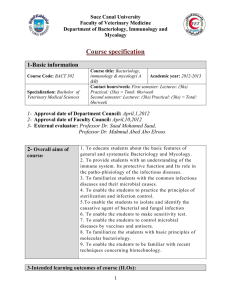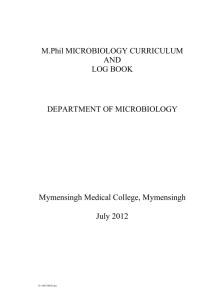Microbiology Course Specifications 2011-2012
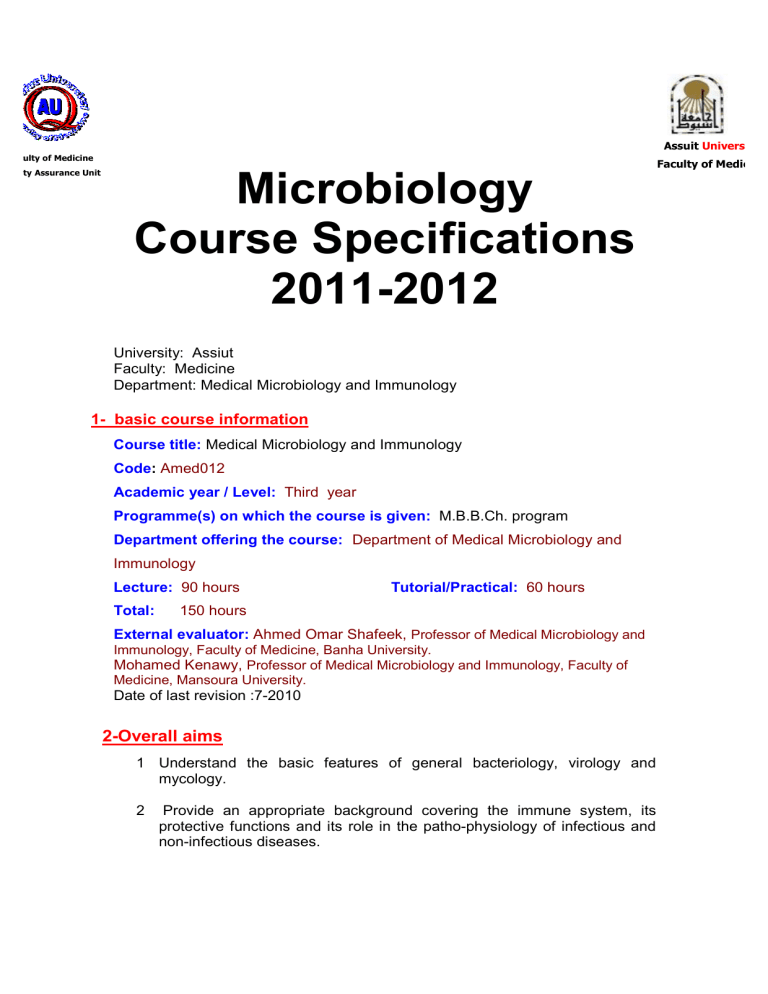
Faculty of Medicine
Quality Assurance Unit
Microbiology
Course Specifications
2011-2012
Assuit University
Faculty of Medicine
University: Assiut
Faculty: Medicine
Department: Medical Microbiology and Immunology
Course specifications:
1- basic course information
Course title: Medical Microbiology and Immunology
Code : Amed012
Academic year / Level: Third year
Programme(s) on which the course is given: M.B.B.Ch. program
Department offering the course: Department of Medical Microbiology and
Immunology
Lecture: 90 hours Tutorial/Practical: 60 hours
Total: 150 hours
External evaluator: Ahmed Omar Shafeek, Professor of Medical Microbiology and
Immunology, Faculty of Medicine, Banha University.
Mohamed Kenawy, Professor of Medical Microbiology and Immunology, Faculty of
Medicine, Mansoura University.
Date of last revision :7-2010
2-Overall aims
1 Understand the basic features of general bacteriology, virology and mycology.
2 Provide an appropriate background covering the immune system, its protective functions and its role in the patho-physiology of infectious and non-infectious diseases.
Faculty of Medicine
3 Know the common infections and diseases of medical importance, their microbial causes, as well as laboratory diagnosis, treatment, prevention and control of such diseases.
Assuit University
Faculty of Medicine
Quality Assurance Unit
4 Practice the principles of sterilization and infection control
3- lntended learning outcomes (ILOs)
A- Knowledge and understanding
By the end of the course, students should be able to:
A1- Describe bacterial, viral and fungal morphology and know their physiology and genetics
A2- Identify the host parasite relationship and microbial pathogens
A3- Describe the physiology of the immune system, its beneficial role, as well as its detrimental role in hypersensitivity, autoimmunity and transplant rejection
A4- Describe the morphology, culture, antigenic structure and virulence factors of microorganisms of medical importance
A5- Mention the most important infectious clinical conditions and outline the diagnosis, treatment, prevention and control of the most likely organisms causing such diseases.
A6- Describe the most important methods of decontamination and principles of infection control.
A7- Describe the basics of antimicrobial uses and resistance
A8- Mention the impact of molecular technology in microbiology and immunology
B- Intellectual skills
By the end of the course, students should be able to:
B1- Comprehend microbiological, immunological and molecular reports
B2- Correlate according to evidence the causal relationship of microbes and diseases
B3- Predict the danger of handling and use of infectious agents on community and environment as a part of their ethical heritage
B4- Categorize a microorganism as a bacterium, virus or fungus according to standard taxonomy
B5- Analyze the results of microbiological, serological and molecular tests.
Faculty of Medicine
Quality Assurance Unit
B6- Develop a systematic approach for laboratory diagnosis of common infectious clinical conditions and recommend the most appropriate and cost-
Assuit University
Faculty of Medicine effective tool leading to the identification of the causative organism.
C- Professional and practical skills
By the end of the course, students should be able to:
C1- Carry out examination of medically important bacteria based on microscopic examination of stained preparations.
C2- Perform a Gram stain and a Ziehl-Neelsen stain and identify microorganisms according to morphology and characteristics, stained preparations.
C3- Examine culture media and biochemical tests commonly used for bacterial identification and distinguish positive and negative results.
C4- Perform hand wash and control of steam sterilization.
D- General skills
By the end of the course, students should be able to:
D1- Display the facts using printable sheets in the field of bacteriology and immunology
D2- Complete a full scientific reports in the field of bacteriology and immunology.
D3- Communicate in groups and team in laboratory experiments
D4- Follow the computer-based tools and internet to extract information and knowledge
4- Course contents
Topic
General Bacteriology
Immunology
Systemic
Bacteriology
General Virology
Systemic Virology
General Mycology
Systemic Mycology
No. of Hours
30
17
64
6
12
8
3
Lecture
18
13
34
4
10
4
3
Practical/Tutorial
12
4
30
2
2
4
-
Applied Microbiology
Faculty of Medicine
Quality Assurance Unit
Total
10
150
5- Teaching and learning Methods:
4
90
6
60
1- Lectures
2- Small group discussion sessions in laboratory
3- Practical classes
4- Micro assignment and reports on up-date infection problems.
5- Quiz to solve case studies
6- Office hours (Tutorial)
7-Special classes outside the teaching schedule
8- Case studies.
Facilities required for teaching and learning:
1- Laminar flow
2- Lap Top
3- Microscope (oil immersion)
4- Laboratories instruments (Incubator – Hot air oven - autoclave)
5- E- learning .
6- Teaching and learning Methods for students with learning
Assuit University
Faculty of Medicine
difficulties:
1- Lectures
2- Small group discussion sessions in laboratory
3- Practical classes using powerpoint facility
4- Micro assignment and reports on up-date infection problems.
5- Quiz to solve case studies
6- Office hours (Tutorial)
7- Special classes outside the teaching schedule
7- Student assessment
A- Methods
1- Written Examination for assessment of knowledge and understanding and
Faculty of Medicine
Quality Assurance Unit intellectual skills (a1-a8, b1-b6)
2- Oral Examination for assessment of knowledge and understanding outcomes,
Assuit University
Faculty of Medicine intellectual skills, and general skills (a1-a8, b1-b6, d1-d4)
3- Practical Examination for assessment of practical skills (c1-c4) and intellectual skills (b1-b6)
4- Quiz to assess intellectual skills (b1-b6)
5- Micro-report to assess general skills (d1-d4)
6- Case studies (A1-A8, B1-B6, C1-C4, D1-D4)
B- Assessment schedule
Assessment 1: Mid term exam by the end of the 1st term
Assessment 2: Course assignment (Microreports and quiz)
Assessment 3: Final practical examination by the end of the year
Assessment 4: Final written examination by the end of the year
Assessment 5; Final oral examination by the end of the year
Assessment 6 - Attendance criteria ( STUDENT PORTFOLIO )&
ASSIGNMENTS
C- Distribution of marks
Assessment 1 and 2 20%
Final written exam 50 %
Final Oral exam 15 %
Final Practical exam 15 %
Total
8- List of references:
100%
1- Course notes:
Department theoretical books and practical manual (Lectures and practical)
2- Essential books:
Medical Microbiology by E.Jawetz 2008.
3- Recommended books: Text Book Of Microbiology,by R. Ananthanarayan,
CK.J Paniker 6 th
(2004)
Faculty of Medicine
Quality Assurance Unit
4- Periodicals and web sites of Microbiology and Immunology,
http://www.med-ed-online.org/
, Midline Pubmed & Google.
Course coordinator: Prof . Ehsan Abdel Saboor Hassan
Prof. Salwa Saied Ahmed
Head of Department: Prof . Ahmad Sadik Ahmed
25/11/2011
Assuit University
Faculty of Medicine
